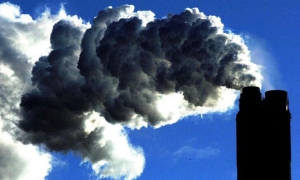 Climate change is a more serious problem than we thought it was just a few years ago. A big rise in global temperature may not happen for another 40 years, but other changes are “imminent,” according to Science magazine. A permanent drought, with Dust Bowl-like conditions, could become the “new climatology” of the American Southwest in a matter of years.
Climate change is a more serious problem than we thought it was just a few years ago. A big rise in global temperature may not happen for another 40 years, but other changes are “imminent,” according to Science magazine. A permanent drought, with Dust Bowl-like conditions, could become the “new climatology” of the American Southwest in a matter of years.
Next December, 190 countries will meet in Copenhagen to discuss a solution. It’s very difficult for politicians, who represent the financial interests of the status quo, to tackle the problems of climate change. As Paul Krugman said recently, a response to global warming would “shuffle the economic deck, hurting some powerful vested interests even as it created new economic opportunities. And the industries of the past have armies of lobbyists in place right now; the industries of the future don’t.”
Dealing with global warming needs wide support from the citizens of all countries. It should be easy for the public to grasp the health implications of climate change. Rather than presenting arguments about carbon emissions and rising sea levels, politicians – and doctors – should be educating the public about the global health crisis that could happen in our lifetime.
More disease, polluted air, not enough food, and dirty water
Mosquitoes, ticks, rodents, and other living creatures carry disease. The geographic boundaries in which these organisms thrive will change, and expand, as global warming proceeds. A one-degree centigrade increase in average global temperature could mean a 23% increase in exposure to malaria in Africa. Malaria is already occurring at higher elevations in Africa. Harmful bacteria found in food and water also thrive at higher temperatures. There’s a good reason we don’t leave mayonnaise sitting out on a hot day.
Global warming is not good for the air we breathe. Allergens will be more concentrated. Air quality will decline, especially in urban areas. This will be particularly hard on children, the chronically ill, and anyone who already has asthma. Whether the global increase in asthma is due to climate change has not yet been established definitively.
Good health requires adequate food and clean water. A one-degree centigrade temperature increase could mean a 40% reduction in food crops and a severe water shortage for 4 billion people. A lack of clean water means more children will die of diarrheal illnesses. Africa could experience a severe water shortage as soon as 2020.
Crop, livestock, and fishery yields will decline, leading to food shortages, hunger, and famine. As a recent JAMA commentary points out: “These cataclysmic events may result in economic instability, mass migrations, civil unrest, and armed conflict in a time of competition for increasingly scarce resources.”
Why is it so hard to act on global warming?
When arguing for US health care reform, you can count the number of people who die each year because they lack insurance. You can count how many people go bankrupt simply because they get sick. The impact of global warming is more difficult to capture.
Global warming is about the weather, which by its very nature is in a state of flux. You can’t prove that a particular catastrophe – the European heat wave of 2003, the Mumbai flooding of 2005, Hurricane Katrina – was the direct result of global warming. When it’s hot one year and cool the next, it’s all too easy to argue that the danger is illusory.
In the US, we’ve been living through an era that places great value on the free market and which distains government intervention. Many politicians are unwilling to question entrenched wisdom and consider the measures required to act on climate change. Some go so far as to claim the problem of global warming doesn’t even exist.
There are too many competing economic interests for the market place to prevent the catastrophes of climate change. This is one of those things that only government action can solve. There needs to be wide public awareness of the consequences of inaction so that enlightened political leaders can overcome short term political and economic interests.
Doctors need to play a greater role in educating the public – and the political and media classes — on the health implications of global warming.
Related posts:
Scientists confront political attacks on climate change
Global warming makes me sick
Climate change: Bad news for children’s health
Doctors and the health crisis of global warming
Have fun. Help the environment. Sell cars.
Sources:
(Links will open in a separate window or tab.)
Paul Krugman, Cassandras of Climate, The New York Times, September 27, 2009
Richard Seager, et al, Model Projections of an Imminent Transition to a More Arid Climate in Southwestern North America, Sciencepress, April 5, 2007 (PDF)
Lindsay F. Wiley and Lawrence O. Gostin, The International Response to Climate Change, The Journal of the American Medical Association, September 16, 2009, Vol. 302 No. 11, p 1218-1220


Sorry, comments are closed for this post.